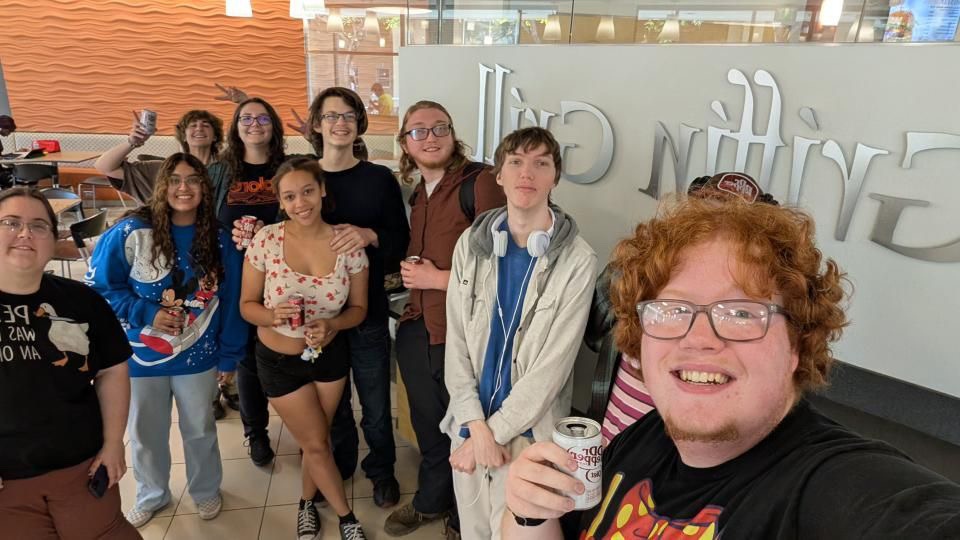GROSSMONT COLLEGE– The 16th Annual Literary Arts Festival featured author, Tim O’Brien, who explained the significance and deeper meaning behind his book The Things They Carried.
Lisa Sanders, a prominent name in the music industry, opened the event with a song entitled Rainbow. Sanders, who has performed with artists ranging from The Dixie Chicks to Sheryl Crow, was recognized in the San Diego Music Awards, and has seven albums to her credit. She donated 200 tickets to the House of Blues for a show the following month.
“Literature is a way of opening our hearts,” said O’Brien.
He offered this bit of advice to all the veterans present in the audience who may be interested in putting their experiences in a book as he once did. If you are passionate about it, he said, sit your butts down and keep them down. Writing is a long process that requires much revision. He insists, you must do this over and over again.
The Things They Carried is a novel about the horrors, brutality, adventures, and nightmares of war. It tells the traumas so many carry following these unexplainable terrors. O’Brien explained it’s a book for military personnel as well as all the families directly affected by the traumas they may have experienced.
O’Brien read a passage from his book about a young girl whose father served in the Vietnam War. Although the story was completely made up, the events are those that very well could have, and most likely did occur. The passage deals with fighting an enemy so many were indifferent about, with the kill or be killed mentality.
Killing becomes instinct, a natural reflex if you will; a lot of times it is something you do with little to no thought. We breed these men to be savages and warp their mind sets, so they are able to do what they have to do to survive. When it’s all over and time to come home, there are so many expectations for them to “snap out of it” and automatically readjust to civilian life. The sad reality is, most struggles in doing so.
O’Brien chose this passage because it is the ultimate reality of war, which as he explains, “is the reality of death.” He focused on a single death to make it more personal. So many times do we catch ourselves turning on the television to more men and women dying from the wars we have been fighting for over a decade. We see the polls and few are hardly affected. It’s because it is not personal and directly affecting our everyday lives. If it were a brother or sister, mother or father, aunt or uncle, husband or wife it would hit home quite quickly. This is the point O’Brien was trying to outline, a life is a life either way you look at it.
The media does a terrible job of recognizing these brave men and women as people; O’Brien explained they give very few details. He brought to life the fact that war does not end after a peace treaty; it goes on in life and in dreams for the men and their families.
O’Brien said his novel is not true, it was all made up and invented, but it is “truer than the truth.” He picks and chooses bits and pieces from actual events and creates a story out of them. He recalls not knowing if it were his bullet that had perhaps killed anyone, war is complete chaos; there were times he would blindly “shoot so they would go away.”
In combat, politics fade away and Darwin’s ideology “Survival of the Fittest” comes into play. Sometimes you do things you don’t necessarily want to do, but do, to preserve your reputation.
He recognized the parallels of today’s wars in Iraq and Afghanistan to the war in Vietnam. We continue to fight a guerilla war in which we are unsure who the enemy really is. In a great explanation of why so many innocent people get caught in the crossfire, he said: “A bullet can kill the enemy; the bullet can also make an enemy.”
This is also why we see on television so many men going crazy and doing things they would normally consider morally unacceptable. War will warp the kindest heart into something they never thought possible. Politicians quick to judge the things the military has done should walk in a serviceman’s boots.
O’Brien told a personal story, not fiction; about a letter he received several years back. A 26-year-old woman wrote him, thanking him for the great piece of literature he wrote. With tears in his eyes, he explained the book was so sentimental because her father went through the same thing; for many years he would not say a word, he wasn’t in his right state of mind.
She thanked him for saving her family. Once she read the book she shared it with her father who slowly began to open up about his experiences. The book offered an understanding of why he was the way he was for all those years. When she asked her mother why she had stayed with him for so many years, she replied, I felt sorry for him. The book opened up their family’s relationship tremendously.
He was capable of enduring his incapacities with the “keep humping” mentality, meaning he just kept pushing through and would not give into the mental challenges.
At 65 years old, O’Brien is the father of a 6-year-old and an 8-year-old. Sadly enough, he realizes his time with them is limited. For this reason, he is now working on a book entitled Two Heads which is a recap of who he is/was and a journal per se, of their life as he grows older. He wants them to be able to pick up the book and relearn the facts and emotions of their lives together.
*
Quijas is editor of the GC Summit. He may be contacted at [email protected]







